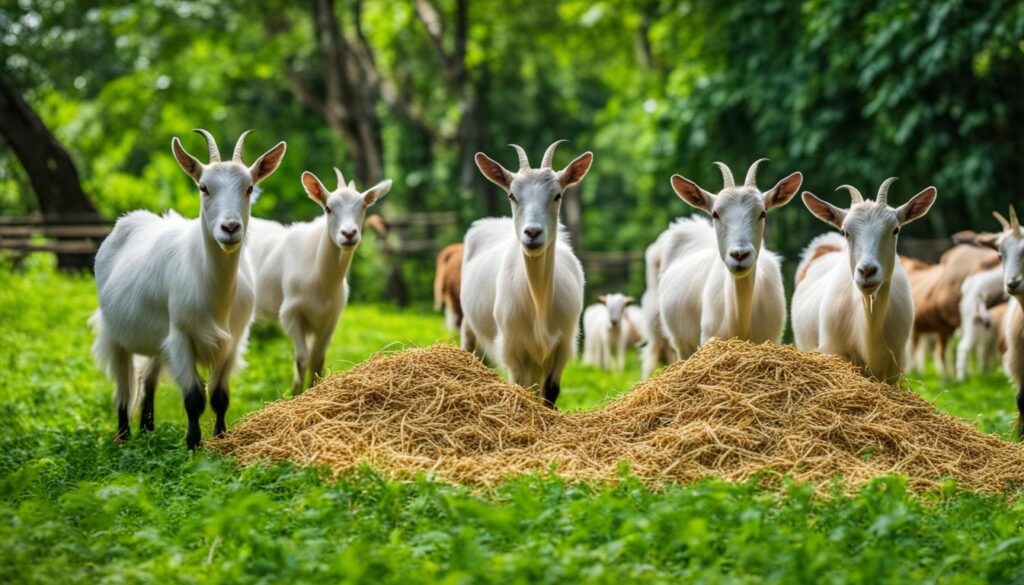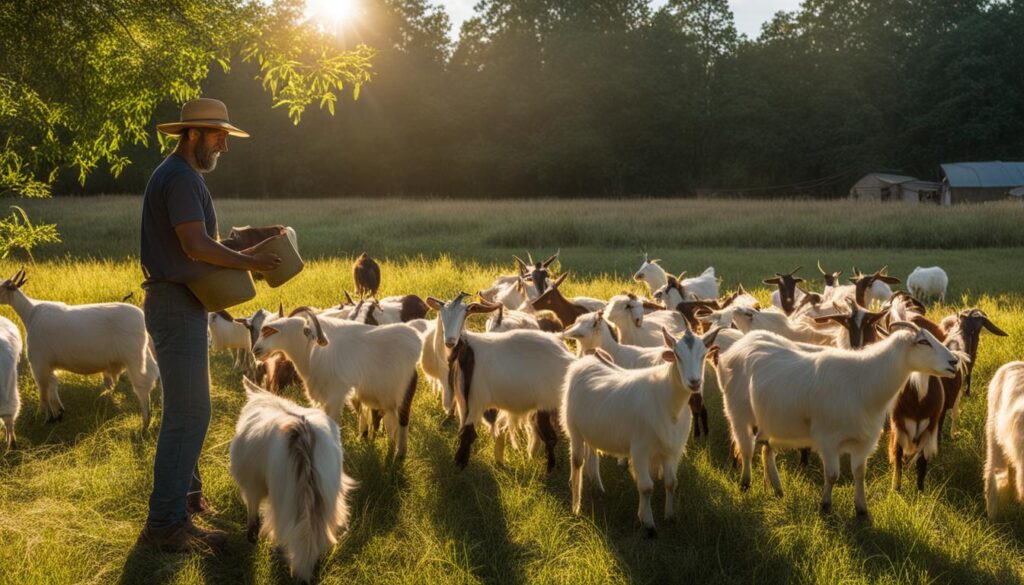As a hobby farmer who cherishes the well-being and nourishment of my goat herd, I’ve discovered the remarkable benefits of incorporating peanut hay into their diet. Beyond mere sustenance, peanut hay offers enhanced nutrition that is perfectly tailored for my backyard goats. It’s a nutrient-dense choice that doesn’t just fill their bellies but enriches their overall health and growth—a game-changer for any dedicated goat keeper striving for optimal backyard goat nutrition.
Choosing the right feed for your goats is not a task to be taken lightly. For me, the transition to peanut hay as a staple in my goats’ diet was motivated by its wholesomeness and the positive impact it has had on my herd. It harmonizes well with the natural dietary preferences of goats and has become an integral part of my routine in managing a thriving backyard farm. Not only have my goats taken well to this palatable feed, but I also take pride in the visible improvements in their health and vitality—thanks to the careful selection of hobby farmers goat feed like peanut hay.
Key Takeaways
- Peanut hay is an excellent source of nourishment for goat herds, particularly in backyard farming setups.
- It’s important to consider palatability as well as nutrition when selecting goat feed for your herd.
- Implementing peanut hay can lead to noticeable improvements in the health and growth of goats.
- Hobby farmers need to provide their goats with nutrient-dense feed options like peanut hay for optimal results.
- Observing the goats during dietary changes ensures a smooth transition and allows for quick intervention if needed.
What Makes Peanut Hay an Exceptional Choice for Goats?
As a dedicated hobby farmer, I’ve experienced first-hand the benefits of peanut hay as a cornerstone in my goats’ diet. The allure of peanut hay lies in its dual promise of optimal goat nutrition and utter palatability, making it a quality goat feed that is hard to surpass. Allow me to delve into the reasons that make peanut hay a remarkable option for your herd.
One of the standout qualities of peanut hay is its high protein content, which is essential for the growth and maintenance of a healthy herd. My lactating does and growing kids in particular have shown a noticeable improvement in their health, suggesting that the additional nutrients provided by peanut hay are making a positive difference.
- Rich in Protein: Assists in muscle development and overall health.
- High Fiber Content: Promotes healthy digestion and gut health.
- Palatable Taste: Encourages goats to eat their required portions.
The hay’s palatability is a huge win; it’s simply a joy to watch my goats relish their meals. This aspect is crucial because a feed’s nutritional value is only as good as the animal’s willingness to consume it. Here, peanut hay doesn’t disappoint.
Since integrating peanut hay into our routine, the vitality and vigor of my herd have noticeably increased. The hay has not only been a hit taste-wise but has also brought visible improvements in endurance and coat quality.
By switching to peanut hay, I’ve seen that even the most discerning goats in my herd have found a new favorite. Below, I’ve charted out the advantages that have solidified my commitment to peanut hay as a staple feed:
| Benefit | Impact on Goats |
|---|---|
| Protein-rich | Supports tissue growth and repair |
| Adequate fiber | Aids in effective digestion |
| Beneficial for lactating does | Meets high nutritional demands |
| Growth of young kids | Provides foundational nutrients for development |
As all good farmers know, the proof is always in the pudding—or, in this case, in the health of the goats. It’s been immensely satisfying to witness how peanut hay has contributed to an upbeat, thriving herd.
In summary, peanut hay has not only met but exceeded my expectations as a feed. It offers significant benefits of peanut hay which align with my aim of providing quality goat feed to ensure optimal goat nutrition. My personal experience has shown me that peanut hay is more than just feed; it’s a solid investment in the health and happiness of my goats.
The Nutritional Profile of Peanut Hay for Goats
As someone deeply invested in the wellbeing of my goat herd, I’ve spent considerable time analyzing the benefits of various feed options. Among the different types of fodder, peanut hay stands out for its comprehensive nutritional profile, especially tailored to meet goat dietary requirements. This nutritious forage not only satisfies their hunger but also provides a rich source of essential nutrients that support their health and productivity.

Protein Content and Its Importance for Goats
Peanut hay protein content is quite remarkable, making it an excellent choice for my herd’s dietary needs. Protein is the building block for muscle development and repair, and peanut hay has proven to be an outstanding source of this nutrient. Incorporating it into the diet of my growing kids and lactating does has resulted in visible health benefits and increased vigor, vital for a thriving herd.
Vitamins and Minerals in Peanut Hay
The vitamin and mineral profile in peanut hay is a boon for my goats, providing them with the necessary elements that are critical for their complex body functions. These micronutrients play a significant role in bone development, immune system strength, and overall physiological health. The abundance of these components in peanut hay has become a cornerstone of my goat’s balanced diet.
Energy Levels: Comparing Peanut Hay to Other Feeds
When comparing peanut hay to other forms of goat feed, its energy-rich quality is immediately apparent. I’ve noted that my goats maintain a consistent level of vitality, which I credit to the high energy content of their peanut hay-based diet. It compares favorably to other feeds in my storage, often outperforming them and thus, sustaining an active and productive herd.
- Peanut hay offers a higher digestible energy level.
- Consistent feed that satisfies my goats’ high metabolic demands.
Managing a goat farm requires understanding and catering to their specific nutritional needs. Peanut hay has been a game-changer for me, providing a wholesome, energy-rich feed that’s packed with protein and essential nutrients. It’s reassuring to know that such a simple change in their diet can yield such significant benefits for their growth and well-being.
How to Introduce Peanut Hay into Your Goats’ Diet
As someone who has undergone the dietary transition for goats, I’ve learned the importance of carefully integrating new goat feed, such as peanut hay, into their diets. The adaptation process should be gradual to ensure that it does not disrupt the goats’ digestive systems. Let me share the method I’ve found effective for incorporating this nutritious feed.

- Mix a small amount of peanut hay with the goats’ current feed.
- Monitor their reactions closely to this new inclusion.
Step Two: Increase Gradually
- Over the course of several weeks, incrementally raise the quantity of peanut hay.
- Continue to observe the goats for any signs of digestive discomfort.
Step Three: Observe and Adjust
- Watch for positive signs such as eagerness to consume the peanut hay and general wellbeing.
- Adjust the mix ratios as necessary, based on the goats’ acceptance and health.
Feeding peanut hay offers numerous benefits, and while integrating new goat feed requires patience, the outcome is a healthier, more nourished herd. Don’t hesitate to take this step—it could be transformative for your goats’ dietary health.
Peanut Hay for Goats: Best Practices for Storage and Maintenance
As a seasoned hobby farmer, I’ve become well-versed in the storage nuances that come with using peanut hay as a primary feed for my goats. It’s not just about buying quality feed; how you store it plays a critical role in maintaining its condition and nutritional value. Hence, learning to store peanut hay the right way helps to maintain hay freshness and prevent hay spoilage, ensuring that my goats always have access to the best.
Storage Tips to Preserve Nutrients and Freshness
I’ve found that the secret to storing peanut hay effectively involves simulating a controlled environment. Dry and well-ventilated spaces are the top two conditions for optimal storage. This attention to detail keeps the humidity at bay and retains the hay’s inherent nutrients. Storing it off-ground on pallets, away from the damaging effects of soil moisture and pests, is another practice I adhere to. Moreover, a protective cover like a tarp shields the hay from the unpredictability of weather, helping to preserve its freshness and quality for more extended periods.
Avoiding Mold: The Importance of Proper Hay Storage
Preventing the onset of mold is crucial in storing peanut hay, as mold can be a disaster, not just for the hay, but for the health of the goats consuming it. I make sure that the hay is thoroughly dry before it gets packed away because moisture is the adversary of preservation. Regular inspections are a part of my routine, vigilantly searching for any signs of spoilage. This preventative approach not only safeguards the health of my goats but also my investment in their nourishment by storing peanut hay in conditions that deter mold formation and spoilage.
